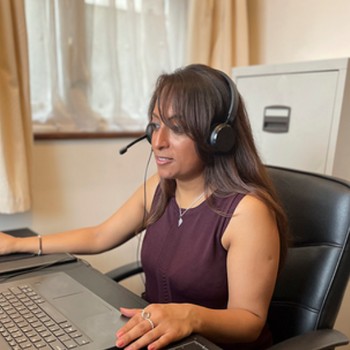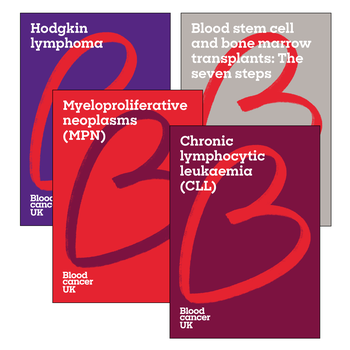Acute myeloid leukaemia (AML)
Acute myeloid leukaemia (AML) is a fast-growing type of blood cancer that usually needs urgent treatment.
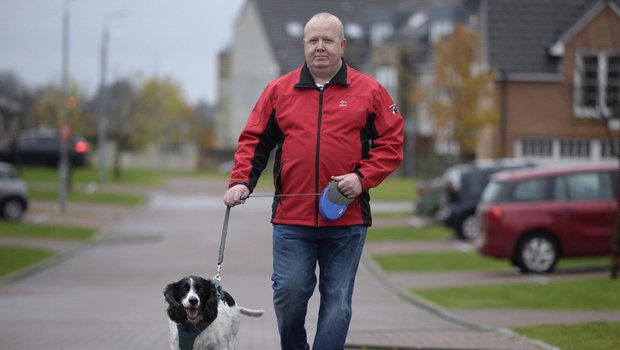
In this section:
What is acute myeloid leukaemia (AML)?
Acute myeloid leukaemia (AML) is a type of blood cancer. It develops very quickly and often needs urgent treatment.
About 3,100 people are diagnosed with AML each year in the UK. Three quarters of these (75%) are aged 60 or over, but AML can happen at any age.
This information is about AML in adults. AML is extremely rare in children and we have separate information about childhood AML.
When you have AML, certain types of blood cells don’t work properly. Faulty blood cells build up in the body and stop your blood and immune system from functioning normally.
AML affects blood cells called myeloid cells, which are a type of white blood cell. White blood cells are important for protecting the body against infection. Find out more about AML:
Finding out you have AML
Being diagnosed with AML, or having someone you love get diagnosed, has probably come as a shock. You might be feeling very overwhelmed, especially if you've never heard of AML.
Sign up to our weekly support email for people recently diagnosed. It gives you clear and simple information, practical tips and advice from others with blood cancer, to help during the first few weeks and months after diagnosis.
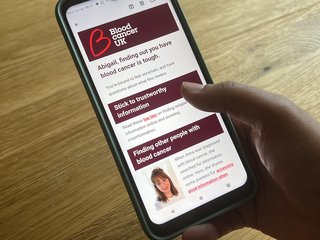
Get a weekly support email from us
We'll send you clear and simple information, practical tips, and advice from other people with blood cancer, to help during the first few weeks and months after diagnosis.
Prognosis for acute myeloid leukaemia (AML)
It’s best to ask your healthcare team about your prognosis if you want to know about it, because they know your individual situation.
For many people, the aim is to get rid of the leukaemia completely (to cure the AML). For other people, this might not be possible, and the aim of treatment might be to control the AML and your symptoms for as long as possible.
Everyone's prognosis is individual to them, but things that can affect prognosis include your age, your general fitness, the specific type of AML you have, and any genetic mutations in the AML cells. We have lots more information about prognosis for AML:
"It was like I was watching a movie and this was all happening to someone else."
Marie, diagnosed with AML in 2016.
Read Marie's story about Coping with a sudden diagnosis of AML.
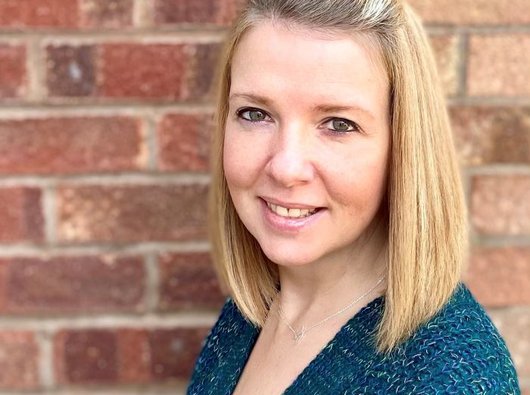
Symptoms and tests for acute myeloid leukaemia (AML)
Common symptoms of AML include:
- tiredness
- breathlessness
- anaemia
- unusual bruising or bleeding
- infections
- fever
- weight loss.
If AML develops very quickly, you might suddenly feel extremely unwell.
If your doctor suspects you might have AML, they will run a series of tests to find out. Find out more:
Causes of acute myeloid leukaemia (AML)
AML happens when something goes wrong in the DNA inside blood cells. We don’t know exactly why this happens.
There are some things that make a person slightly more likely to get AML – these are called risk factors. Risk factors for AML include:
- age
- being born male
- family history
- smoking
- having some other blood conditions
- having certain medical treatments in the past
- some genetic disorders.
Most people with these risk factors never develop AML. So it's important to remember that AML can happen to anyone, and it’s not because of anything you have done. Find out more about causes of AML:
Treatment for acute myeloid leukaemia (AML)
Treatment for AML usually starts quickly after diagnosis, and lasts several months.
There are two main groups of treatments for AML: intensive treatments and non-intensive treatments. The treatment your doctor recommends will depend on the type of AML you have and your general health.
Treatment usually involves a combination of drugs, such as chemotherapy drugs and targeted therapy drugs. Some people will need a stem cell transplant. Most people will need to be in hospital for their treatment.
Treatment for AML does cause side effects, but everyone reacts to treatment differently. Common side effects of intensive treatment include:
- increased risk of infection
- hair loss
- feeling sick or being sick
- mouth ulcers.
There are things you can do to reduce most side effects, if you tell your doctor or nurse about them quickly. If you have non-intensive treatment, your side effects will usually be less severe. Find out more:
"When you’ve got AML, one of your number one questions is - what do I need to do in order to beat this?"
Graeme, diagnosd with AML in 2017.
Read Graeme's story about How to keep your positivity during treatment.
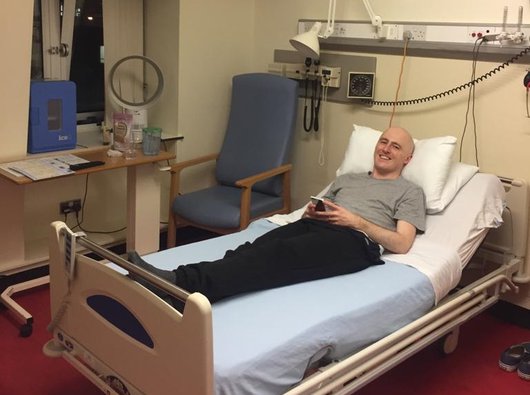
Research and clinical trials for acute myeloid leukaemia (AML)
Clinical trials are how we find new treatments and improve current ones. We can help you find out about clinical trials for AML. Even if you just want to know a bit more about AML research, try our Clinical Trials Support Service.
You can also read about the impact our leukaemia research has had for people with AML.
Living with acute myeloid leukaemia (AML)
An AML diagnosis is life-changing and does have a big impact on you, and your family and friends.
There is lots of support available, so don't be afraid to use this. It will help you get through treatment and life with AML. For your loved ones, it will help them cope with what's happening.
You can find out about:
- practical tips for living with AML
- support for children
- support for your family and friends
- help with money worries
- emotional support for you.
Find out more:
"Today I got diagnosed with acute myeloid leukaemia. I'm feeling confused, scared and quite emotional. I guess it is normal to feel like this. What should I expect?"
People with AML are discussing how they feel about treatment and supporting each other on our online forum. Read the conversation and join if you want to here: Just diagnosed with AML
Life after AML
Finishing treatment for AML is a big achievement, but it can take time for your body to recover. You can build your fitness back up over time though.
Remission can often bring mixed feelings. Many people feel relieved and happy that it's over. But it's also common to feel vulnerable, alone or worried about the future.
There are things you can do to adjust to life after AML, and other people in remission from AML have good advice. Find out more:
If someone you love has been diagnosed with AML
If your family member or friend has been diagnosed with AML, you might find our information for family and friends helpful. It covers how to support someone with blood cancer, practical tips, coping with your own emotions, and real stories from other friends and family members.
You may also want to try our podcast for family and friends, Blood Cancer Heart to Heart, featuring honest conversations between people who know what it's like to have a loved one diagnosed with blood cancer.
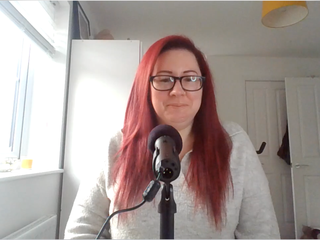
Blood Cancer Heart to Heart podcast for family and friends
"I thought this is it. I’ve driven here as your girlfriend, and I've left as a doctor, a pharmacist, a nurse, a carer - everything all rolled into one."
Thank you to Advanced Nurse Practitioner Kirsty Crozier, Consultant Haematologists Richard Dillon and Professor Steve Knapper, and Clinical Fellows Francesca Hogan and Victoria Ware for checking the medical content of our AML information.

